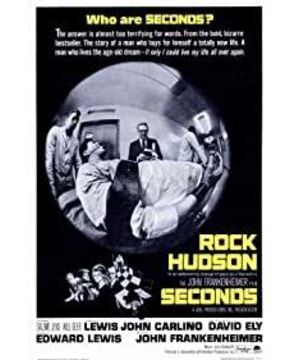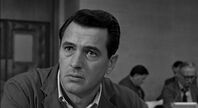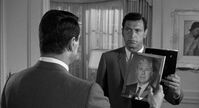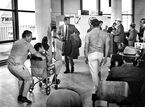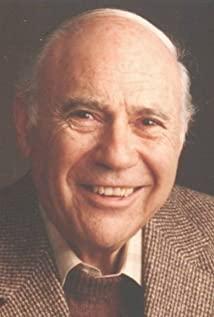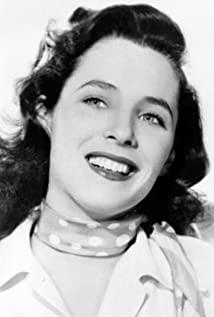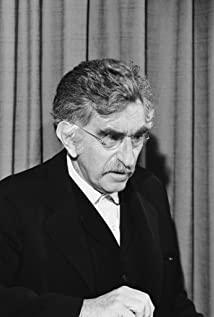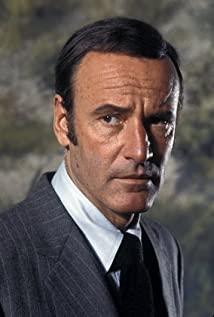Shot in pure noir, the film is the neglected companion to Frankenheimer's cult masterpiece The Manchurian Candidate. We don't have space here to discuss the film's many salient features, such as its opening with one of the best opening titles Saul Bass has ever made (which can be compared with Bass's three great Hitchcock films) (Vertigo, North-by-Northwest, and Psycho), a distorted, distorted fragment of a human face in a broken mirror constitute. The film tells the story of a middle-aged man, Arthur Hamilton, who has lost his purpose in life: he is bored with his banker job, and his love with his wife has lost its vitality. After receiving a call from Evans, a friend he thought had been dead for a few years, Hamilton learned that there was a secretive organization called The Corporation that could give the wealthy a second chance at life. After the contract was signed, the company faked an accident for Hamilton, using a corpse to fake his death. After extensive cosmetic surgery and psychoanalysis, Hamilton becomes Tony Wilson (Rock Hudson) and moves into his dreamy new home in Malibu, where he acquires a definite identity as a painter, There are some new friends and a loyal footman. (Details of his new life suggest that there was once a Tony Wilson, but what happened to him is a mystery.) He quickly develops a relationship with Nora, a young woman he meets on the beach . They took part in a nearby booze festival, which then developed into a totally boozy sex orgy, which he reluctantly took part in. He was happy for a while, but before long he was troubled by the emotional confusion of his new identity and his renewed youthful vigour. At a party for his neighbors, he got himself drunk and started babbling about his former life as a Hamilton.
As a result, his neighbors are also "reborns" like him, sent to monitor his adjustment to his new life. Nora is actually a detective in the company, and her attention to Wilson is set to make sure he will cooperate. After escaping from his new home in Malibu, Wilson visits his ex-wife under his new identity and learns that the reason for his failed marriage was his pursuit of career and material possessions, which others had led him to believe were very important in life. Frustrated, he returned to the company and asked them to give him another identity; the company agreed, on the condition that he introduce some old acquaintances who might want to be "reborn." While awaiting surgery, Wilson met Evans, who couldn't accept his "rebirth" new identity. At the film's ominous end, the doctor drags Wilson into the operating room, and when he's stuck in a chair, he learns the truth: Those who, like him, can't adjust to their new identities don't get their expected identities, they change Became the corpse of the faked death of a new customer.
Reborn echoes the philosophical-ideological topic we've been discussing: the reduction of the subject to a blank slate, the hollowing out of all its substance, and its rebirth, its re-creation from scratch. The theme of rebirth is here given a clear critical-ideological twist: by turning himself into Wilson, Hamilton has achieved the life he has always dreamed of; Things go horribly bad when one part of the same repressed reality is escaping. In other words, Hamilton-Wilson paid a bitter price for his incomplete denial of the past: his revolution could not transform its own premises. Hegel foresaw such inevitability, writing: "To change a corrupt moral system and its structure and legitimacy, without changing religion, is modern folly, a revolution without change." [4] In a fundamental revolution, the people don't just "realize their old (liberation) dreams"; they also recreate the patterns of dreams. Isn't that the formula for the relationship between the death drive and sublimation? Here lies the necessity of the Cultural Revolution, which Mao Zedong grasped well: as Herbert Marcuse put it, in the circular formula of the same era, freedom (free from ideological coercion, free from dream) freedom of the dominant mode) is a condition of liberation, in other words, if we change reality only to realize our dreams, without changing those dreams themselves, then sooner or later we will revert to our previous reality. A Hegelian "positioning of premises" operates here: the hard work of liberation retroactively constitutes its own premises.
In Reborn, Wilson pays the price for "revolution without change": when he rejects the life of a banker mired in a loveless marriage, he thinks he has escaped from the oppressive realities of society In this repressed social reality, the Other (or rather the ideological "Other") defines his dreams and tells him what to desire. After his rebirth, he discovers that the phantasmagorical core of his existence—a claustrophobically repressed innermost dream of a real life—is still determined by the existing order. The shenanigans of this "inherent trangression" couldn't be more clear in the boozy orgies, a scene that gleamed the hippie lifestyle (the film was set in 1966) and was cut from the premiere because it was completely Frontal nudity was not allowed at the time. It exudes a painful, repressed inertia that clearly refutes the notion that a spontaneous joie de vivre (joie de vivre) will burst forth liberatingly.
At the end of the film, Wilson is sacrificed as a substitute so that other subjects can be reborn; this once again illustrates the Hegelian-Christian lesson: the price of my rebirth is the destruction of another person's body, such as ,Christ.
From Žižek's "Living in the Last Days" on Hollywood's ideological degradation.
View more about Seconds reviews


